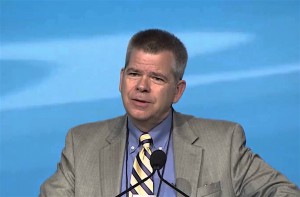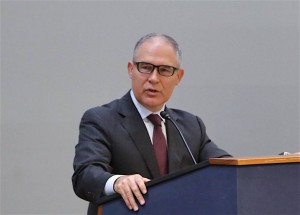
Maine Attorney General Janet Mills said 14 states would file a lawsuit against the EPA if it eased CAFE standards, saying changes would violate federal law.
If the Trump Administration elects to rollback current and future emissions standards, 14 states plan to file a lawsuit forcing the current CAFE standards to remain in place.
The Environmental Protection Agency announced it would reopen the review period for fuel economy and emissions standards set to go into full effect in 2025. Automakers initially hailed the move by the agency, but have since said they’re in favor of the tougher mandates.
That hasn’t stopped the agency, led by former Oklahoma Attorney General Scott Pruitt, a well-known climate-science skeptic, from moving ahead with the process. The EPA is still technically in the information gathering stage so no decisions have been made, but officials have essentially said they expect to make a change.
However, if the EPA elects to roll back or ease the current standards Maine Attorney General Janet Mills said she and 13 other attorneys general were “prepared to go to court. We are vigorously opposed to this rollback.”
(EPA automakers have “golden opportunity” to work together. To find out why, Click Here.)
Mills and other groups, such as the Union for Concerned Scientists, American Lung Association and American Security Project, made their feelings clear about any easing of requirements during a press conference.

Chris Grundler, EPA director of air quality, is now in favor of easing CAFE rules to improve the working relationship with automakers.
Pruitt said the current standards didn’t follow the rules and thus were “legally flawed.” She noted the group sent a letter to Pruitt expressing their concerns about the potential of a change to the standards, saying that the review was indeed conducted legally and agreed to by the auto industry as well, describing them as “affordable, achievable and common sense.”
Mills said not only were the rules as they currently stand well vetted, they could actually be tougher — a sentiment echoed by other groups opposed to changes. She said that softening the requirements would violate federal laws, including the Clean Air Act.
“It was not flawed at all,” she said. “It is irrational and irresponsible to roll back these standards in our view.” She also noted that Pruitt has not responded to the letter even though he “was one of our compatriots.”
(Automakers do about face on CAFE standards. Click Here for the story.)
While the states involved in the potential lawsuit could simply follow the standards set by the State of California and the California Air Resources Board. California has a waiver from the federal guidelines; however, Mills noted the EPA has discussed eliminating the waiver.
The other groups noted there were several reasons to keep the requirements in place, including an estimated $45 billion in savings, the elimination of more than 225 metric tons of greenhouse gases and the elimination of potential security threats to the U.S.

Scott Pruitt, EPA chief, is expected to push for holding the line on CAFE standards for 2021 instead of the more stringent 2025 requirements.
Ken Kimmell, president of the Union of Concerned Scientists, who will testify during the hearings, said that the changes have already shown that the automakers clearly can rise to the challenge of meeting tougher standards.
More importantly, he noted that the auto companies have made the changes as consumer tastes have changed toward larger sport-utility vehicles, which are more fuel efficient than ever. He also noted that those shifts in consumer preferences are also not an excuse for not meeting the standards.
(Click Here to see how CARB and the EPA were ready to face off in an emissions showdown.)
CAFE standards set to rise to 54.5 mpg by 2025. Last week, the EPA floated the possibility of freezing the rules at 2021 levels. In the real world, adjusted for various credits and other factors, that would bring the numbers down to the low to mid-40 mpg range, or about 9 mpg lower than what was originally called for.

2022 is not far away and If the OEMs value certainty, then they might want to consider reigning in the effort to roll back the 2022-2025 standards. California might react by enacting even tougher regulations as a response since they are technically possible plus the 14 states can apply considerable legal resources to suing the EPA and creating even more uncertainty. If EPA tries to pull the California waiver then the fight will go nuclear and an all out legal war will ensue and be fought in a way that the OEMs will likely find very unattractive.